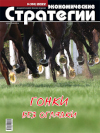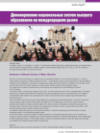Dominance of National Systems of Higher Education
DOI: https://doi.org/10.33917/es-3.183.2022.148-163
The theory of economic dominance in a multilevel economy, developed by Blokhin A.A. and Lomakin-Rumyantsev I.V., has been actively tested by researches on different markets since 2019 — the distribution of players in the markets allows to formulate different strategies for their development. This article is a development of studies devoted to the study of competition in the education market and presents the result of economic dominance of national higher education systems in the international market. This research aims to analyze the subject areas of social sciences and management, for further identifying dominance in the QS ranking.
The sample consists of 58 QS subject rankings for 2018–2021. The main instrument is the SV-matrix (strength/variety). The analysis outlines areas of subject ratings where there is dominance of national educational systems and characterizes its level. In addition, an interpretation of the situation when constructing the SV matrix, where Lind index shows boundary values when determining dominant group size. The SV matrix gives valid results and allows both qualitatively and quantitatively assessing the positions of countries in educational rankings. Analysis using SV-matrix made it possible to identify 8 out of 15 subject areas, in which there is clear dominance and determined positions of Russian universities relative to the dominant group. The hypothesis of United States presence in the dominant group in most areas of social sciences and management was confirmed, however, several subjects were defined, where the higher education system of anther countries were in the lead. The scientific novelty of this study lies in the proposal and testing of a method for assessing the level of dominance of national educational systems in the international education market. The SV matrix allows to analyze the positions of different countries in the international educational space, both in dynamics and in statics (to assess the level of competitiveness of national educational systems); to understand theoretically the level of differentiation of national educational systems in certain subject ratings; to assess the concentration (barriers to enter the rating) and the strength of competition (how strongly the players differ) of subject areas.
Источники:
1. Kireeva N., Slepenkova E., Shipunova T., Iskandaryan R. Competitiveness of Higher Education Institutions and Academic Entrepreneurship. Espacios, 2018, no 23, pp. 15–25.
2. Nefedova A.I. Masshtaby, struktura i tseli eksporta rossiiskogo vysshego obrazovaniya [Scales, Structure and Reason for Export of Russian Higher Education].
Mir Rossii. Sotsiologiya. Etnologiya, 2017, no 2, pp. 154–174.
3. Vorob’eva E.S., Krakovetskaya I.V. Prodvizhenie rossiiskikh vuzov v mirovye reitingi konkurentosposobnosti: tsel’ blizka? [Promoting Russian Universities in the World Ratings of Competitiveness: is the Goal in Sight?]. Kreativnaya ekonomika, 2017, no 5, pp. 521–552.
4. Sarrico C., Godonoga A. Research Handbook on University Rankings: Higher education system rankings and benchmarking. Massachusetts, USA: Edward Elgar Publishing Limited, 2021.
5. Zadorozhnyuk I.E., Korosteleva L.Yu., Tebiev B.K. Top-200 vuzov v chetyrekh mezhdunarodnykh reitingakh: sravnitel’nyi analiz [Top 200 Universities in Four International Rankings: Comparative Analysis]. Vysshee obrazovanie v Rossii, 2019, no 3, pp. 85–95.
6. Rodionov D., Rudskaia I., Kushneva O. The importance of the university world rankings in the context of globalization. Life Science Journal, 2014, vol. 11, no 10, pp. 442–446.
7. Aljuboori A. F. University ranking and evaluation: Trend and existing approaches. The 2nd International Conference on Next Generation Information Technology, 2011, pp. 137–142.
8. Aref’ev A.L. Global’nye reitingi universitetov kak novoe yavlenie v Rossiiskoi vysshei shkole [Global University Rankings as a New Phenomenon in Russian Higher Education]. Sotsiologicheskaya nauka i sotsial’naya praktika, 2014, no 7, pp. 5–24.
9. Antoniuk L., Kalenyuk I., Tsyrkun O., Sandul M. Rankings in the higher education competitiveness management system. Problems and Perspectives in Management, 2019, no 4, pp. 325–339.
10. Antonova N.L., Sushchenko A.D. Akademicheskaya reputatsiya universiteta kak faktor liderstva na global’nom obrazovatel’nom rynke [University’s Academic Reputation as a Factor of Leadership in the Global Educational Market]. Vysshee obrazovanie v Rossii, 2019, no 6, pp. 144–152.
11. Miller J. Higher education: should other countries follow the US model? Int. J. Business and Globalisation, 2019, no 4, pp. 681–695.
12. Zhang H. Results of project “5–100”: positions of leading russian universities in top-100 of three leading world rankings. EurasianUnionScientists, 2020, vol. 8, pp. 22–28.
13. Kalenuk I., Kuznetsova N. University competitiveness indicators. Theoretical and applied issues of economics, 2021, pp. 49–69.
14. Marginson S. Global stratification in higher education. Higher Education Dynamics, 2016, vol. 45, pp. 13–34.
15. Prikhod’ko L.V., Kameneva E.A. Global’naya konkurentosposobnost’ vysshego obrazovaniya: mirovye strategii i luchshie praktiki [Global Competitiveness of Higher Education: World Strategies and Best Practices]. Gumanitarnye nauki. Vestnik Finansovogo universiteta, 2020, no 6, pp. 12–18.
16. German Excellence Initiative: everything you need to know. Academics.com, available at: https://www.academics.com/guide/germanexcellence-initiative.
17. Salmi J. Excellence Strategies and the Creation of World-Class Universities Global Perspectives on Higher Education. Sense Publishers, 2016.
18. World University Rankings 2020, available at: https://www.timeshighereducation.com/world-university-rankings/2020/world-ranking#!/page/0/length/25/sort_by/rank/sort_order/asc/cols/stats.
19. Akoev M.A., Valeeva M.V., Yablokov E.B. Kontsentratsiya chelovecheskogo kapitala v issledovatel’skikh universitetakh kak osnova konkurentosposobnosti obrazovatel’nykh sistem i ee otrazhenie v global’nykh reitingakh universitetov [Concentration of Human Capital in Research Universities as a Basis for Educational Systems’ Competitiveness and Its Reflection in Global University Rankings]. Upravlenie naukoi: teoriya i praktika, 2021, no 2, pp. 137–160.
20. Linda R. Methodology of concentration analysis applied to the study of industries and Markets. Brussels: Commission of the European Communities, 1976.
21. Blokhin A.A., Lomakin-Rumyantsev I.V., Naumov S.A. Al’fa-biznes na rossiiskom prodovol’stvennom rynke [Alfa-Business in the Russian Food Market]. Ekonomicheskie strategii, 2019, no 6, pp. 68–77, DOI: 10.33917/es-6.164.2019.68-77.
22. Vertogradov V.A., Shchelokova S.V., Ivanchina A.A. Avtomobil’nyi rynok RF: strategii kompanii i deistviya regulyatorov (2009–2021) [Russian Automotive Market: Company Strategies and Regulators’ Actions (2009–2021)]. Strategii biznesa. 2022. № 2. S. 33–41.
23. Vertogradov V.A., Shchelokova S.V. Dominirovanie v autsorsinge biznes-protsessov v Rossii [Dominance in Business Process Outsourcing in Russia]. Problemy rynochnoi ekonomiki, 2022, no 1.
24. Shchelokova S.V., Vertogradov V.A. Analiz nalichiya i struktury dominiruyushchikh grupp na rynke sel’skokhozyaistvennykh predpriyatii Rossii po itogam 2020 goda [Analysis of the Presence and Structure of Dominant Groups in the Russian Market of Agricultural Enterprises in 2020]. APK: ekonomika, upravlenie, 2022, no 1, pp. 41–52.
25. Shchelokova S.V., Vertogradov V.A. Mozhno li dokazat’ tsiframi sushchestvovanie “bol’shoi chetverki” na rossiiskom rynke audita [Is it Possible to Prove with Figures the Existence of the Big Four in the Russian Audit Market?]. Audit, 2022, no 1, pp. 15–21.
26. Manchenko M.I. Rynok ekspress-dostavki skvoz’ prizmu ekonomicheskogo dominirovaniya [Express Delivery Market Through the Lens of Economic Dominance]. Logistika, 2020, pp. 9–15.
27. Bataev A., Bataeva K. Proceedings of 2018 17th Russian Scientific and Practical Conference on Planning and Teaching Engineering Staff for the Industrial and Economic Complex of the Region. Analysis of Performance Indicators of Russian Universities in the International Arena, 2019.
28. Suslova I.P., Govorova A.V., Shchelokova S.V. Analiz rynka onlain-obrazovaniya v Rossii v kontekste teorii ekonomicheskogo dominirovaniya [Analysis of the Online Education Market in Russia in the Context of Economic Dominance Theory]. Mir novoi ekonomiki, 2021, pp. 77–84.
29. Studnikov S.S. Vysshee obrazovanie v Rossii: rastsvet ekonomicheskogo dominirovaniya [Higher Education in Russia: the Rise of Economic Dominance]. Mir novoi ekonomiki, 2021, pp. 112–120.
30. Carayol N., Filliatreau G., Lahatte A. Impact, dominance and universities ranking. Revue Economique, 2015, vol. 66, no 1, pp. 173–194.
31. Hou J.W.J., Hou Y.-W., James J.W. What contributes more to the ranking of higher education institutions? A comparison of three world university rankings. International Education Journal: Comparative Perspectives, 2017, vol. 4, pp. 29–46.
32. Mussard M., James A. Engineering the Global University Rankings: Gold Standards, Limitations and Implications. IEEE Access, 2018, vol. 6, pp. 6765–6776.
33. Novenkova A.Z., Abilov A.V., Vershinina O.A., Medvedeva M.Y. Influence of ratings on universities: An outward glance. Journal of Social Sciences Research, 2018, vol. 4, no 12, pp. 527–530.
34. Gaisenok V.A., Naumovich O.A., Samokhval V.V. Correlational relationships between various international rankings for higher education institutions. Vysshee Obrazovanie v Rossii, 2018, vol. 27, no 12, pp. 20–28.
35. Kathiresan G., Mahendran S. Cluster analysis of top 200 universities in Mathematics. International Symposium on Mathematical Sciences and Computing Research, 2015.
36. Moskovin V.M., Zhang H., Sadovski M.V., Serkina O.V. Comprehensive quantitative analysis of TOP-100s of ARWU, QS and THE World University Rankings for 2014–2018. Education for Information, 2021, pp. 1–37.
37. Polyakov M., Bilozubenko V., Korneyev M., Nebaba N. Analysis of key university leadership factors based on their internationalrankings (QS World University Rankings and Times Higher Education). Problems and Perspectives in Management, 2020, vol. 18, no 4, pp. 142–152.
38. Moed H. A critical comparative analysis of five world university rankings. Scientometrics, 2016, pp. 967–990.
39. Millot B. International rankings: Universities vs. higher education systems. International Journal of Educational Development, 2015, vol. 40, pp. 156–165.
40. Navodnov V., Motova G., Ryzhakova O. The method of league analysis and its application in comparing global university rankings and Russia’s University performance monitoring. Voprosy Obrazovaniya. Educational Studies Moscow, 2019, vol. 3, pp. 130–151.
41. Shastitko A.E., Zyubina A.L. Upravlenie ekonomicheskimi issledovaniyami v rossiiskikh vuzakh: naukometriya i mezhdunarodnye reitingi [Economic Research Management in Russian Universities: Scientometrics and International Rankings]. Mir novoi ekonomiki, 2019, no 3, pp. 112–126
42. Yui S. Reiting universiteta kak komponent PR-strategii prodvizheniya na rynke obrazovatel’nykh uslug [University Rating as a Component of the PR-strategy for Promotion in the Educational Services Market]. Mir nauki, kul’tury, obrazovaniya, 2021, no 89, pp. 346–349.
43. Fan’khun M. Formirovanie strategii vuza dlya podgotovki kadrov v internatsional’noi srede [Forming a University Strategy for Training Personnel in an International Environment]. Sovremennoe pedagogicheskoe obrazovanie, 2020, no 8, pp. 4–8.
44. Yalovega I.E. Mezhdunarodnyi reiting vuza: kachestvo obrazovaniya ili sub”ektivnoe dominirovanie? [International University Ranking: Quality of Education or Subjective Dominance?]. Vestnik Tomskogo gosudarstvennogo universiteta. Ekonomika, 2015, no 4, pp. 279–288.
45. Vertogradov V.A., Shchelokova S.V. Matritsa SV: instrument strategicheskogo konkurentnogo analiza dlya otsenki urovnya dominirovaniya [SV Matrix: Strategic Competitive Analysis Tool for Assessing Level of Dominance]. Vestnik Moskovskogo universiteta, 2021, Seriya 6: Ekonomika, no 6, pp. 137–142.
46. Vertogradov V.A. Rynochnye strategii al’fy, bety i gammy v kontekste teorii ekonomicheskogo dominirovaniya [Alpha, Beta and Gamma Marketing Strategies in the Context of Economic Dominance Theory]. Ekonomicheskie strategii, 2020, no 2, pp. 50–53, DOI: 10.33917/es-2.168.2020.50-53.
47. QS [QS], available at: https://support.qs.com/hc/en-gb.



